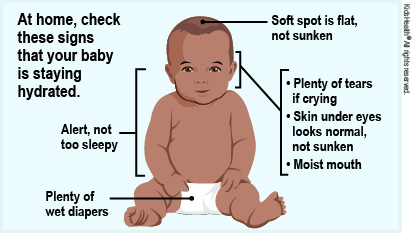Dehydration: How to Care for Your Baby
Dehydration is when there is not enough water in the body. In babies, it is often caused by vomiting, diarrhea, or both.
Your baby stayed in the hospital to get fluids through an intravenous (IV) line or a nasogastric tube (a thin flexible tube that goes into the nose and down to the stomach). Now your baby is feeling better and can go home. Follow these instructions to make sure your baby gets enough fluids at home.


For breastfed babies:
-
Continue to breastfeed. If your baby doesn't want a full feeding or is vomiting, you can try breastfeeding more often, but for shorter amounts of time (5–10 minutes every 1–2 hours).
-
If the health care provider recommended it, give your baby oral rehydration solution (such as Pedialyte®, Enfalyte®, or a store brand) between feedings:
-
If your baby is not vomiting, you can offer the oral rehydration solution in a bottle.
-
If your baby is vomiting or having trouble taking the oral rehydration solution from a bottle, you can try using a small cup, spoon, or syringe to offer your baby 1–2 teaspoons (5–10 mL) every few minutes.
-
If your baby is eating solid foods, offer your baby's regular foods. As long as your baby is drinking, it's OK if he or she doesn't want solid foods at first.
For formula-fed babies:
-
Continue to offer your baby formula. If your baby doesn’t want a full feeding or is vomiting, give your baby smaller, more frequent feedings.
-
If the health care provider recommended it, give your baby oral rehydration solution:
-
If your baby is not vomiting, you can offer the oral rehydration solution in a bottle.
-
If your baby is vomiting or having trouble taking the oral rehydration solution from a bottle, you can try using a small cup, spoon, or syringe to offer your baby 1–2 teaspoons (5–10 mL) every few minutes.
-
If your baby is already taking solid foods, offer your baby's regular foods.
You can give less and then stop the oral rehydration solution as your baby starts taking more breastmilk or formula.
You will know that your baby is staying hydrated (getting enough fluid) if he or she:
Reminders:
-
You can buy oral rehydration solution at a drugstore or supermarket without a prescription. If you can't get oral rehydration solution, talk to your health care provider. There are other fluids that you can give to help your baby.
-
Don't give plain water instead of oral rehydration solution. It doesn't have the right nutrients to help babies with dehydration.
-
Don't give sports drinks, soda, or full-strength (undiluted) juice. They have too much sugar and can make some symptoms worse.
-
Follow the health care provider's recommendations for any diet changes.
-
It may take 3–4 days for your baby's appetite to come back. As long as your baby is drinking and having a wet diaper every 4–6 hours, it's OK if he or she is not eating solid foods.
-
Don't give medicines for diarrhea or vomiting unless your health care provider recommends it.

Your baby:
-
is drinking only oral rehydration solution (no breastmilk or formula) for 24 hours
-
won't take anything to drink for more than a few hours
-
vomits more than a few times in 24 hours
-
has vomit that's bright green, red, or brown
-
shows signs of dehydration such as a dry mouth, no wet diaper in 4–6 hours, fewer tears, or sunken soft spot


How does dehydration happen? Dehydration in babies usually is caused by vomiting and/or diarrhea. It also can happen when babies don't want to drink because they have mouth sores or a sore throat.
How can I prevent dehydration when my baby is sick? Whenever your baby gets sick, give extra fluids or oral rehydration solution. Give small amounts often, especially if your baby is vomiting. Call your health care provider if you see any signs of dehydration, such as a dry mouth, no wet diaper in 4–6 hours, fewer tears, or sunken soft spot.
Is dehydration dangerous? Mild dehydration in healthy babies usually isn't dangerous. But dehydration that gets more severe can cause the body to shut down and can even become life-threatening.